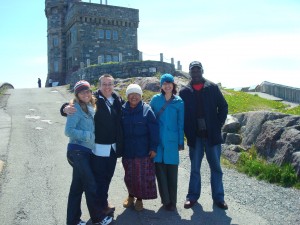Eastern Tour: St. John’s – Make It Right
The eastern leg of the “Not Business as Usual” tour kicked off in my home province of Newfoundland with a walk on the rocky beach at Middle Cove, a meal of fish and chips in Beachy Cove and a day trip to Cape Spear, Signal Hill, and Quidi Vidi Village.
Sharing the beauty and history of my home with colleagues (Rachel Warden and Caroline Foster) and partners (Isaiah Kipyegon and Naty Atz Sunuc) was a wonderful experience, but also a sobering one. The fish and chips led to a discussion of the change in fishery patterns from my grandfather’s time to the age of factory-freezer ships and the collapse of the Northern cod stocks. Driving through pine scrub led to a discussion of the logging industry and the closing of mills. We passed supply vessels for the offshore oil rigs as we walked along the harbour, and I was reminded of just how much this province depends on the extraction of natural resources for its wealth. It even sends people away to dig up oil in Alberta.
Despite the fact that, until recently, Newfoundland was a “have-not” province, its people have benefited from its resource economy more than some of Canada’s Indigenous peoples and people in the global South.
And while they have been engaged in what participants termed an “unsustainable” economy, neither have we in North had to bear the burden of the industrial economy’s ecological legacy: global climate change.
At tonight’s event at the Lantern in St. John’s, Isaiah Kipyegon of Norwegian Church Aid in Kenya and Naty Sunuc of CEIBA in Guatemala talked to the group about the impacts of climate change — drought, loss of land and cattle, and flooding, to name just a few — and called for real solutions, the most crucial of which is changing our behaviour as consumers and that of our corporations and governments. Ken Kavanagh of the Council of Canadians followed up with a look at Canada’s most significant contribution to the climate crisis, the tar sands.
Looking at the pictures of devastation that all three shared could lead you to believe that the situation is hopeless. But listening to the solutions that they and participants identified — conservation, renewable energy built with community consent, transparent aid for climate adaptation, a halt to destructive projects, and committed political engagement — it was possible to see hope.
As Isaiah told us, it is possible to change. It is possible to make it right.









